Coronavirus corruption in Kenya: Officials and businesspeople targeted
- Published
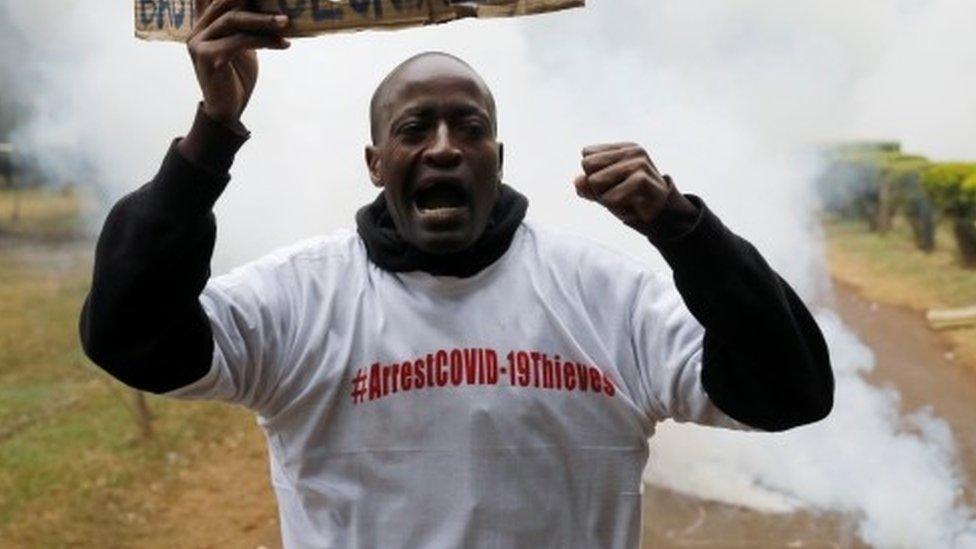
Police have fired tear gas to break up protests about alleged corruption
Kenyan investigators are to recommend the prosecution of at least 15 top government officials and businesspeople over the alleged misuse of millions of dollars meant for buying Covid-19 medical supplies, the BBC has learned.
The probe uncovered evidence of tenders being allegedly given to politically connected individuals and businesses.
The government ordered an investigation following a public outcry.
It received about $2bn (£1.6bn) in aid and grants to fight Covid-19.
But health workers have complained about a shortage of public protective equipment (PPE), saying their lives are at risk.
The state body responsible for purchases, the Kenya Medical Supply Authority (Kemsa), has denied that any money was stolen.
What are the allegations?
The first phase of investigations has centred around the alleged misuse of $7.8m meant to purchase emergency PPE for healthcare workers and hospitals across the country.
Investigators from Kenya's Ethics and Anti-Corruption Commission (EACC) say preliminary findings have shown that several laws on public procurement were flouted during the awarding of the tenders.
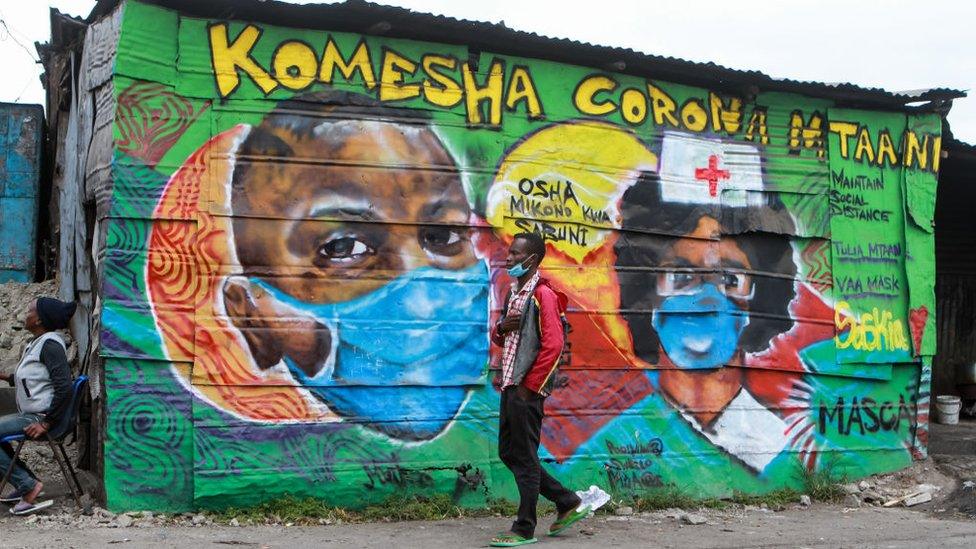
Artists have painted graffiti in Kenya's capital, Nairobi, to show support for health workers
In a report to a joint Senate Committee on Health and Covid-19 on Wednesday, the EACC said: "Investigations had established criminal culpability on the part of public officials in the purchase and supply of Covid-19 emergency commodities at Kenya Medical Supplies Authority (Kemsa) that led to irregular expenditure of public funds."
The EACC has recommended the prosecution of all officials at Kemsa and the Ministry of Health who it believes were behind the scandal.
The second phase of investigations will target companies that are alleged to have benefitted from the tenders, although there is no suggestion any of the companies misappropriated Covid-19 funds.
Documents submitted to the Senate committee, and which the BBC has seen, show the nature of contracts handed out by Kemsa.
In some cases, tenders were given to companies that had been formed just weeks earlier.
A good example is Shop and Buy limited, which, the documents allege, got tenders worth $10m despite being formed in February, just weeks before the first case of Covid-19 was reported in the country.
The company has denied any wrongdoing.

You may also be interested in:
Students at this Kenyan university are voluntarily making critical medical kits

Other examples are of businesses associated with politicians. According to the documents, one company was owned by relatives of a sitting governor.
Also contained in the documents are contracts worth millions of dollars given to people with personal connections to the very highest levels of power.
In other instances, PPE was supplied to Kemsa at what is claimed to be hugely inflated prices, sometimes as high as three times the current market rate.
What were the effects of the alleged corruption?
The scandal hit the country even as doctors and nurses complained about a lack of PPE as the country battled the coronavirus outbreak.
In August, health workers went on strike over poor working conditions and lack of supplies.
Some took to social media to show the sub-standard gloves, hazmat suits and face shields that had allegedly been distributed by the government.
They have since gone back to work but have issued another strike notice over the government's failure to pay the Covid-19 allowances that had been agreed.
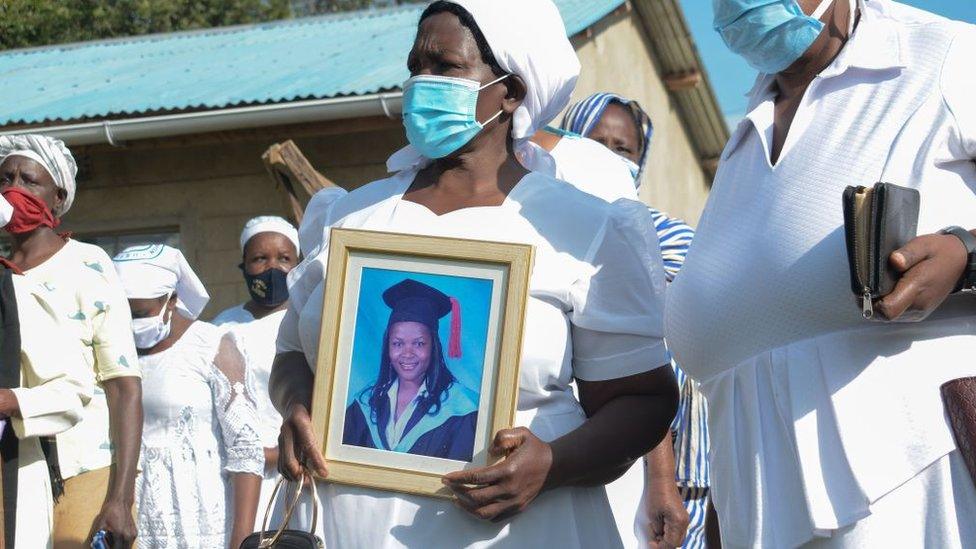
Grace Lugaliki was the first doctor to die from Covid-19 in Kenya
Doctors have also claimed that misappropriation of funds may have led to the deaths of some patients.
"Let's say, theoretically, there was money meant for setting up a Covid-19 isolation ward, or for PPE for healthcare workers and that money has been misappropriated," said Dr Ancent Kituku, Health Minister in Machakos County.
"Definitely, that can be correlated with deaths. And it's true to say then that corruption has led to deaths in this country," he added.

VACCINE: How close are we to finding one?
GLOBAL SPREAD: Tracking the pandemic

At least 1,000 doctors have been infected with the virus so far. Ten have died. This is despite Kenya receiving more than $2bn of aid and grants to help tackle the pandemic.
Those who gave money included the World Bank, International Monetary Fund, the World Health Organization (WHO) and Chinese billionaire Jack Ma's foundation.
What do those involved say?
Top Kemsa officials have defended themselves against the allegations. The chief executive officer, Jonah Manjari, and two other officials from the body have been suspended as investigations continue.
Appearing before lawmakers earlier this month, Mr Manjari said he had acted under instructions.
"I was under a lot of pressure to provide commodities for this country, we received SMSs, we received phone calls, we received emails, letters and we were told to distribute to several hotspots at that time.
"There were requests from the Permanent Secretary, the Cabinet Secretary, most of the requests were via phone calls and SMS," he added.
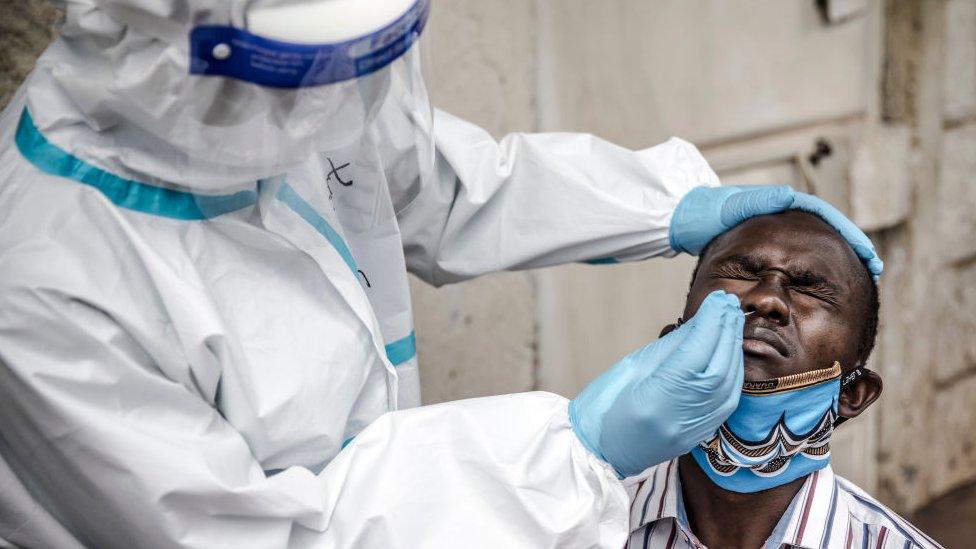
Kenya has recorded more than 37,000 cases of coronavirus
Kemsa board chairman Kembi Gitura, however, admitted that the body had exceeded its yearly budget without proper authorization.
"The board did not give Kemsa approval to exceed its budget, but this was a pandemic and unprecedented. We hadn't budgeted for Covid," he said.
They have also appeared before the Senate inquiry and were grilled for hours this month on what they knew about the scandal.
But on Wednesday, Kemsa was accused by the country's Public Procurement Regulatory Authority of refusing to reveal the names of 25 companies which had won tenders.
What is the government doing about it?
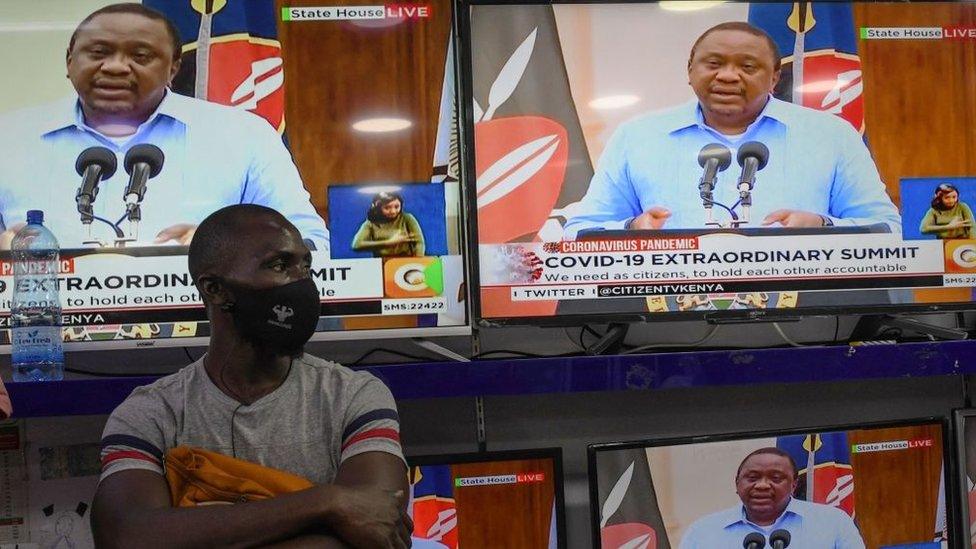
President Kenyatta is under pressure to curb corruption
President Uhuru Kenyatta has promised to get to the bottom of what happened.
On 26 August, he ordered investigating agencies to finalise the investigations within 21 days. That deadline was missed.
The EACC has already forwarded its initial report and recommendations to the director of public prosecutions.
How serious is the coronavirus situation in Kenya?
Kenya has so far recorded more than 37,000 cases of coronavirus with 659 fatalities. More than 24,000 people have recovered, and the country has over the last few weeks seen a drop in the number of cases reported.
The country has also eased strict measures it had put in place in March when it recorded its first case.
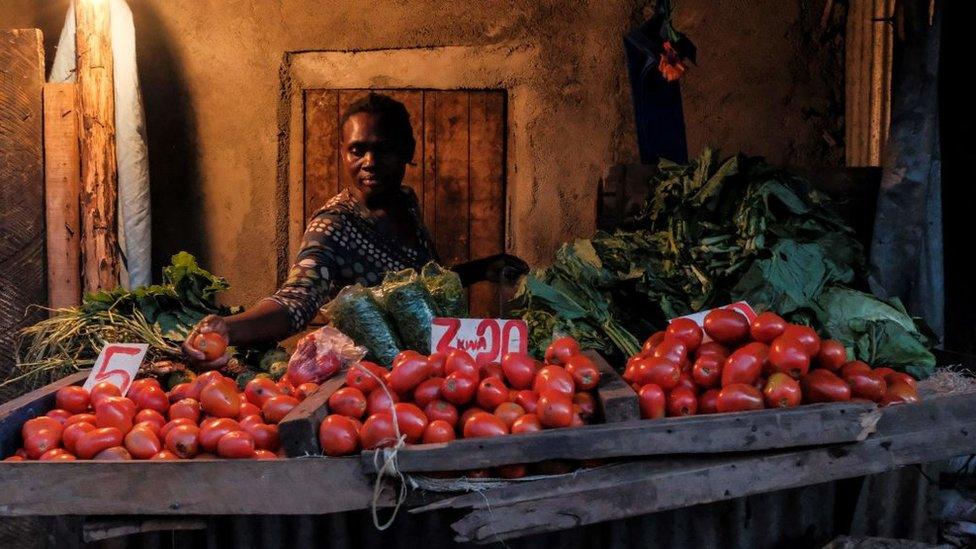
Traders complain of a drop in business because of Covid-19 restrictions
Borders have been re-opened and places of worship have been allowed to operate again but under strict health guidelines. But a curfew from 21:00 to 04:00 local time is still in place
The corruption scandal has however put pressure on President Kenyatta, who came to power in 2013, promising economic growth and to fight corruption.
But his government has been blighted by numerous allegations of corruption.
Senator Sylvia Kasanga, who is leading the Senate inquiry into Covid-19 corruption, told me she would be pushing for prosecutions - starting with Kemsa officials
"Kenyans want prosecutions, we all want prosecutions. We are all frustrated... Everyone involved has to carry their cross," she said.